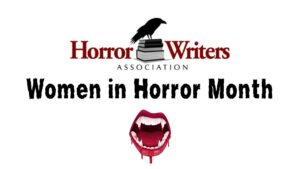Women In Horror Month 2024 : An Interview with Eda Easter

What inspired you to start writing?
Growing up an only child on an isolated horse farm in Texas, I amused myself reading and wandering in nature. The farm animals and barn cats became my captive audience, I’d either read stories to them or tell them stories I made up. Writing the stories down became the next step for me.
What was it about the horror genre that drew you to it?
Horror for me was about the thrill of the jump scare, or the dread of creeping terror. But my love of horror has evolved. I don’t believe in true love, but I believe in pure evil. I think of Neil Gaiman’s quote that we aren’t teaching them monsters exist, we’re teaching them they can be defeated.
Do you make a conscious effort to include female characters and themes in your writing and if so, what do you want to portray?
My main characters were usually male for years until someone pointed that out to me. I realized I had been writing what society modeled to me through common media. Male characters were powerful and had adventures. Females were sidekicks or were baby/marriage-focused. I couldn’t identify with that. Good-Bad I want to be the one with the gun. I write exclusively female MCs now. They have agency over themselves and the world. They’re not always good people or caretakers. They fight back, they kill, and sometimes they save the world. I portray women in all their bloody glory. During the pandemic, I even started publishing a horror magazine that is strictly from the female gaze. Last Girls Club magazine has cemetery tours, book reviews, funny quizzes, a political cartoon, salty women in history column, astrology done by a real moon priestess, and our patron witch who profiles the season. Along with a dozen or so horror short stories and poems submitted by international authors. Every issue has a theme. The Spring Issue is Poison.
What has writing horror taught you about the world and yourself?
Horror has taught me our collective fears reflect the state of society, the horror that hits me the hardest is the pain we inflict on ourselves through madness or hallucination, and endings that are ambiguous or lack justice may be more artistic but are way less satisfying for me. I think most of us these days just want a win.
How have you seen the horror genre change over the years? And how do you think it will continue to evolve?
I think horror has become smarter and edgier. Even the gore has an elegance that reminds me more of Hellraiser than the Saw franchise. I love the inclusion of alternate universes and hard science in horror, as well as the trend of folk horror lately. I think the fall of society and colony collapse due to the corruption of the Earth’s atmosphere will be the next hot topic. My next issue’s theme is Fire Season, inspired by the rain of ash we’d get in Southern California in the late summer/early fall from all the forest fires. It became normal for everyone to wake up to find grey ash piled on the windshield wipers of their car or keeping pets and children inside due to air quality. Things are only going to get worse from here.
How do you feel women have been represented thus far in the genre and what hopes do you have for representation in the genre going forward?
That’s a double-edged sword for me. In some ways, since the 1970s the desecration of women’s bodies was used to instigate terror or action, but at the same time women in horror could be leads and often escaped or defeated the thing that was pursuing them. I think the sheer number of female authors these days and the sophistication of our audiences will refine and uplift the portrayal of women, people with non-conforming identities, and the neurodivergent in the genre and hopefully over time influence other aspects of society breaking us free from the cage of gender norms and roles available to all.
Who are some of your favorite female characters in horror?
Amy Dunne in Gone Girl, Suzy Bannion and Helena Markos in 2018’s Suspiria, Ellen Ripley in the Alien franchise, Jessie Burlingame in Gerald’s Game, Kirsty from Hellraiser.
Who are some women who write horror that you recommend our audience check out?
Gillian Flynn, Shirley Jackson, Joyce Carol Oates, V. Castro.
What is one piece of advice you would give horror authors today?
Join associations and writers groups, go to conferences, make friends in the industry, take writing classes. You’ll accomplish more with the support and advice of people in the industry, rather than existing in a vacuum and struggling alone. Avoid the artistic cannibals: people who talk a good game, but don’t produce anything. If all they are doing is making money off other authors then their advice is suspect.
And to the women who write horror out there who are just getting started, what advice would you give them?
Be overconfident and submit for professional rates, invest money/time in improving your writing, see every rejection as an accomplishment, keep going, and always edit for grammar.
 Bio:
Bio:
Eda Easter dabbles in all genres, but her favorites are fairy tale retellings, animal fantasy, and feminist horror. She’s internationally published in writer’s journals and online magazines. After years of struggle, in 2006 she finally achieved her BA in journalism then realized how unsuited she was for the industry. In a desperate effort to not drink herself to death during the pandemic, she began publishing her magazine Last Girls Club in 2021.Her novella Killer RV is available from Solstice Publishing on Amazon. Her podcast is Blood & Jazz on Spotify, her Patreon is at patreon.com/lastgirlsclub and her website is www.lastgirlsclub.com



